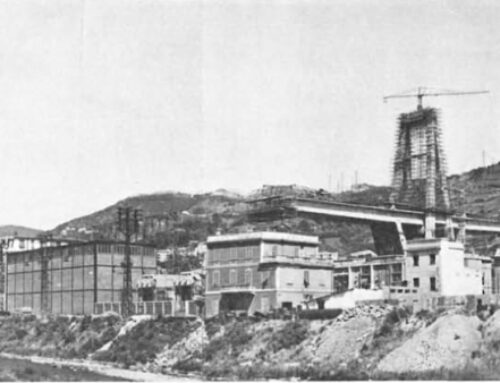It is reasoned that there is serious damage to the operational capacities to face the challenges of global change: the disappearance of the vast area as a place for the exercise of politics, a devastating blow pursued for years and finally accomplished with the DelRio reform, with the demolition of the provinces and, in fact, the mountain communities.
Half of the Italian provinces with the best quality of life are in areas with small towns and collaborative networks: this is no accident. But we do not know how to set an institutional policy and direction for that territorial dimension, after the failure of the provinces.
Like the finest demolishers of skyscrapers, the constitutional referendum demolishes with a few charges entire institutional edifices built with patience and effort. When the dust settles from the debates about who won and who lost, one will see a pile of wreckage where until now stood a functioning structure, albeit with its aches and pains and maintenance needs. Yeah, because anyway we have learned, through a crash course of comparisons between opposing reasons, that the current institutional set-up does not work, but also that the proposed reform does not stand. Not even the most Machiavellian scrapper would have succeeded in the pars destruens such as what six months of par condicio electoral confrontations have produced.
So now we are left with a magnificent reconstruction phase.
Like after an earthquake you start with an inventory of the damage.
Here I would like to reason about a serious damage that is little talked about: the disappearance of the vast area as a place for the exercise of politics.
As reformers we realized that the identity base of citizenship lies in cities (nomen omen), and that on the other hand Italy is still a politically significant term, well in health after federalist acne. We have come to realize that intermediate bodies (the provinces, but also the regions and all the rest) are not representative of accomplished identity senses and therefore easily harbor inefficients and profiteers, who have no direct match in people’s opinion.
Believing ourselves to be novice Alexandrians as reformers, we beat around the bush thinking that the malfunctioning knots of the institutional machine could be put right with a sword.
So let’s abolish the provinces and while we’re at it, the mountain communities, reduce the capacity for regional government and everything else that moves us away from commune-state dualism.
On the other hand, one cannot expect a wrecking caterpillar driver to also be a good builder. So we can’t be surprised when we don’t quite know what to do when we find that 5,000 municipalities with a population of less than 3,000 can’t even hold up the elementary tasks of minimum citizen service, that big cities no longer fit within the historical administrative boundaries of the capital municipality.
The therapies that have been put in place are bankrupt even before they come into operation: the Unions of minor municipalities, which will soon be compulsory, are the site of brawls and chaotic cross-party alliances between centres that are physically distant but belong to the same party; the metropolitan cities, ten years after their institution, do not work and have the suburbs in revolt against the mayors of the capital that obviously only answer to their voters and are felt as feudal lords by the municipalities in the belt.
And this is just the tip of the iceberg: we fill our mouths with sustainable development and pretend not to know that there is no sustainable development strategy that does not have a local basis, and that there is no local development except in large areas, far beyond the size of the municipalities. And some institutional form will have to represent these large areas if they are so important for the future of our services and businesses.
Among the thousand naivetries of the new institutional project of territorial government, the lack of a strong link between the state and the municipality is perhaps the most detrimental.
Strategic issues such as higher services and production districts, environmental, energy, communication networks, and the landscape, need choices and management skills not at the level of the regions, which need to be settled but do their job well or poorly, but at the lowest level, where the municipality cannot generalise, by its nature, and the state or region cannot specify, by their nature.
We lack vision for the future of the vast area, that local dimension that has become important in post-modernity, when urban effects have expanded over the territory without making cities, when easy transport has minimised the differences between life and production in the centre and in the suburbs. It is such a recognised strategic level that in many countries it is now the only way for municipalities to access key investments, whether European or state.
It is difficult to find a solution for governing these aspects: in transalpine countries, they try technical agencies, paid by the centre but at the service of the peripheries, to deal with transversal sectoral issues, such as environmental and landscape governance, health districts (or industrial or tourist districts). They are technical operators who for two generations now have been helping municipalities and local entrepreneurs to coordinate on a territorial basis to develop common sector programmes and plans.
But as always, the technical solution is implicitly a political choice. In the first generation, the statistical basis and standardised approach to solutions prevailed in the performance of agencies, emphasising the national and European interest in unifying local behaviour according to predefined models. Recently, orientations have changed and agencies are more oriented towards co-optation processes and promoting participation, but they still rely on established decision-making hierarchies, where command centres are pre-established and their choices prevail over others. The largest cities are the strongest link in this chain of command and prevail over the surrounding territory.
Now in Italy we live in a period of deep allergy to standard solutions coming from above, and capital cities are experienced as ‘high’ by the other centres.
This is not just ideology: some facts give reason to the revolt against central command and the major cities. For example, in these days the long-awaited ranking of the quality of life in the Italian provinces came out (ItaliaOggi-Università La Sapienza).
The top 10 provinces are in order Mantua, Trento, Belluno, Pordenone, Siena, Parma, Udine, Bolzano, Vicenza, Lecco (between 1000 and 800 points, where Bologna takes 550, Milan 480, Turin 350, Rome 230). As always until now, the first places are occupied by very different territories, governed by different parties, but united by being made up of medium, small and very small towns, far from the metropolitan areas (and in the north, except Siena). These are territories with a long tradition of autonomy, often polycentric, a historically consolidated balance between the centres and the peripheries, and solid cooperation between the public and private sectors. There, they have developed a lay capacity to experiment with the possibilities offered by central European and state laws and strategies to achieve results that are useful to everyone in the territory they consider their own. In those parts, it is often possible to feel as one’s own not the municipality, but a broader sphere, because one is accustomed to doing politics by moving within a system of equal relations between large and small centres, in the conviction that everyone serves something, within a shared design.
It is this dimension of ‘proper territory’ that needs to be studied, to understand its virtuous qualities in the ways in which resources and services are managed. Perhaps at that level and in those parts we can find the habits of a new (and ancient) political competence of respect between the parties, of complementarity, of long-range strategies that seek balance rather than competition.
We propose a polytechnic laboratory, in the sense that Vittorini gave it, which would look at the good political practices of the best settled provinces and make them a model for accompanying institutions. Before the accompaniers become carers.




